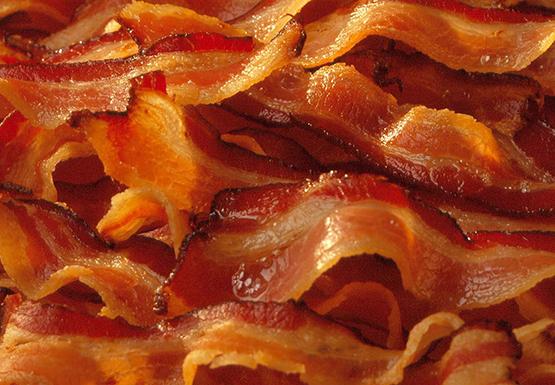Bacon: The marketing fad that desperately needs to sizzle out

During my online Christmas escapades last year, I couldn’t help but throw a tube of bacon-flavored toothpaste in my Amazon shopping cart. It was meant to be a gag gift for my sister, a girl who hoards the strips of pork meat at family breakfasts.
But since then, I’ve seen both the Internet and retail stores filled with more bacon products, ones that will surely find their place under Christmas trees as “real” gifts this year.
Bacon vodka. Bacon ice cream. Bacon duct tape. Bacon deodorant (because masking body odor with a grease scent is always a good option).
These products are all on the market, and it seems that the bacon trend is still on the rise. And honestly, I don’t think it will ever decline. Americans seem to be obsessed with this fatty food more than they are with our national pastime.
Not only is bacon high in sodium, but it is also high in saturated fat. But one of the biggest health concerns associated with bacon is the amount of sodium nitrite in it. According to the Environmental Protection Agency, expose to higher levels of nitrates or nitrites has been associated with increased instances of cancer in adults, and possible increased instances of brain tumors, leukemia, and nasopharyngeal (nose and throat) tumors in children in some studies.
Even the risk of forming cancer doesn’t seem to be discouraging people from consuming massive amounts of bacon per year. According to the Physicians Committee for Responsible Medicine, the average American eats about 18 pounds of the processed meat per year. It would take a lot of those little strips to make 18 pounds.
I see the obsession with the nitrite-filled, colon-rectal-cancer-inducing meat as an extension of the YOLO principle. If you’re unfamiliar with the acronym, you’ve probably been under a rock for the past few years, but it’s the youth’s mantra “You Only Live Once.”
Just as YOLO is the reason behind (or justification for) doing stupid and reckless things, over-eating bacon and obsessing over it is done because life is uncertain. It’s easier to focus on the here and now, on bodily wants and indulgence, rather than focus on the big picture. And if something were to happen tomorrow, most people would feel better about going out with clogged arteries and a happy heart.
But the obsession with bacon goes beyond its consumption. Loving bacon, and then having to tell everyone else about it automatically places one within the larger bacon-loving community. I don’t know how many foods you can like that much and be considered cool for doing it. Even the cupcake fad didn’t have as strong of a sense of community as the bacon community does.
The strong bond may come from a mutual, subconscious desire to metaphorically stick it to authority. Medical professionals have warned against the adverse side effects of bacon and other processed meats for years, and most advise to consume it in moderation. Clearly, a lot of us have trouble doing things in moderation.
Bacon may be the outlet for those who practice moderation in every other facet of their life. If it’s the addictive quality of it that keeps them coming back, then I suppose it’s better than them becoming addicted to illegal substances. If the worst thing people do is love bacon, then let them at it. I won’t be getting cozy with a tub of maple-smoked ice cream anytime soon, though.











